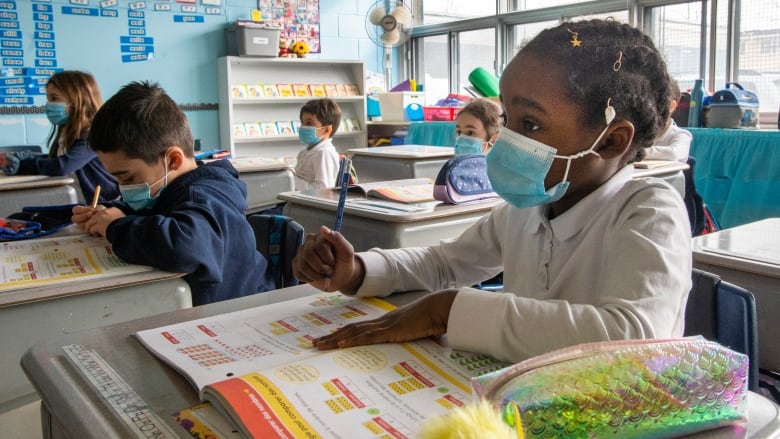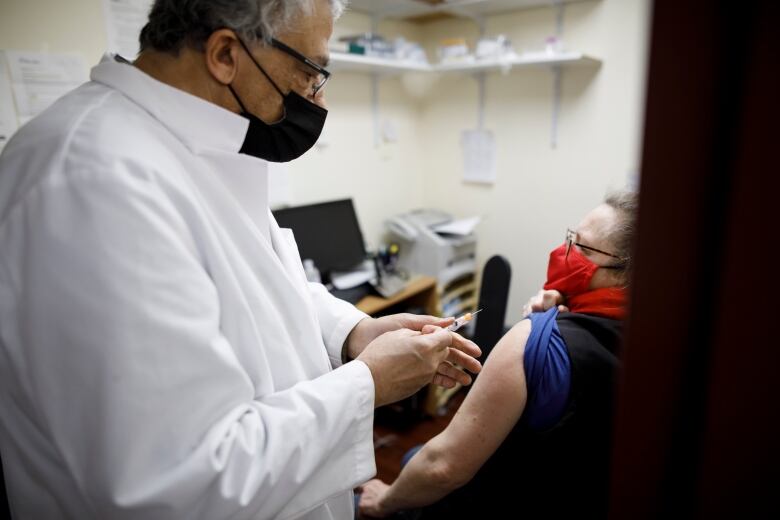What governments, individuals can do to tame Canada's third wave of COVID-19: epidemiologist
School closures ‘rational thing to do’: Raywat Deonandan


Epidemiologist Raywat Deonandon compares the pandemic to an action movie, which traditionally has three acts.
"The third act is when our heroes fight the biggest foe. It's when the dawn is near, but the last big crisis must be overcome," Deonandan, who is also an associate professor at the University of Ottawa, told Dr. Brian Goldman, host of The Dose and White Coat, Black Art.

That last big crisis, he said, is the third wave of COVID-19, which has already hit Ontario. The province's COVID-19 science advisory table said Tuesday that Ontario is in a third wave, fuelled by the B117 variant of concern, first identified in the U.K.
But there are steps governments and individuals can take to avoid a third wave in other regions of Canada, and to reduce that wave in Ontario, said Deonandan.

'Erring on the side of school closures'
To start, it's time to consider closing schools in hot spots, he said.
"Now is the time to be as conservative as possible with the decisions we make to prevent the need for extending restrictions. And if that means erring on the side of school closures, I think that's the rational thing to do."
Deonandan pointed to European countries like Germany and Portugal which are experiencing third waves.

Those countries "measured transmission of a higher-than-expected nature among school-age children, according to some metrics," he said.
In Ontario, there are currently more than 900 publicly funded schools with at least one reported case of COVID-19, and more than 30 schools are closed because of outbreaks in the school. That's the highest number since December.
Deonandan acknowledged that his opinion was unpopular, and while he agrees that the mental health benefits of in-class learning have to be weighed against the public health benefits of closing schools, "strictly from the perspective of managing the spread of the disease, I think [closing schools] is something that has to be considered."

Dr. Jacqueline Wong, a pediatric infectious disease specialist at McMaster Children's Hospital in Hamilton, Ont., disagrees, arguing schools should stay open at all costs, and the evidence is that schools aren't contributing to transmission.
"I strongly feel that closing schools won't prevent a third wave. Internally we haven't seen strong consistent evidence that closing schools mitigates these subsequent waves."
Education is a fundamental right and children need it to thrive, said Wong, adding there are also significant harmful effects on children when schools are closed, including a "huge toll on mental health."
The mitigation strategies used in schools in the first and second waves — mask wearing, distancing, hand hygiene — will work in this third wave, even with the more transmissible variants of concern, said Wong.
Government action needed
So far, the third wave is only in Ontario, but Deonandan said, looking at the current models, it's likely to hit Quebec, B.C. and Alberta as well.
He said it's not too late for governments across Canada to take steps to avoid the third wave or mitigate its damage.

First, they need to speed up vaccinations. While it's likely too late in some regions like Ontario for the vaccination rate to stop a third wave, said Deonandan, "vaccination, we know for sure, gets us the prevention of serious sickness … and it gets us the prevention of suffering."
Death rates will likely be lower in the third wave, he added, because the most vulnerable, those living in long-term care and those over 80, have been vaccinated.
Second, governments need to double down on testing, tracing and isolating, said Deonandan.
"We've done a really bad job of this, a horrible job," said Deonandan. "Rapid tests aren't perfect. I understand that they have flaws. It comes down to whether they can be used with imagination and with restraint to do a specific kind of job."
For example, rapid testing needs to be ramped up in schools and workplaces, he said.

Finally, governments need to make capital investments in upgrading ventilation systems, particularly in schools, because the scientific consensus is that COVID is airborne, according to Deonandan.
"That means we need air purifiers in buildings. We need cross breezes. We need high ceilings. Yes, that costs money, but it's a good investment in the long term for the health of your children."
What you can do
Individuals have it in their power to avoid or blunt the third wave, said Deonandan, by reducing contacts and following public health guidelines like masking and social distancing.
The next few weeks are key to avoiding exponential growth of COVID cases, he added, and while people are tired, if they double down now, a return to some form of normal life will come faster.
Deonandan said this pandemic has been like the "marshmallow experiment writ large."
The marshmallow test was a study on delayed gratification conducted at Stanford University in 1972. In the study, children could choose to have a marshmallow immediately, or if they could wait 15 minutes they could have two marshmallows.
"So if we cannot take the marshmallow now, if we cannot go to the restaurant, the bar, that party, then guess what? In a couple of months, we get all the marshmallows. We get our social life back. But if we take that marshmallow now, this discomfort might have to endure longer than we needed to," said Deonandan.
End is near despite third wave, predicts epidemiologist
If Canadians buckle down and weather the next two or three months, we could be looking at a relatively normal summer, said Deonandan, in that "shutdowns and economic restrictions will be over by early summer."
While the pandemic will likely percolate and even explode in parts of the world, especially in lower income countries where vaccination rates are lower, he predicts that Canadians "will definitely have indoor parties and gatherings by the fall."
After that, "the sun will start to rise and it will stay high in the sky," he said.